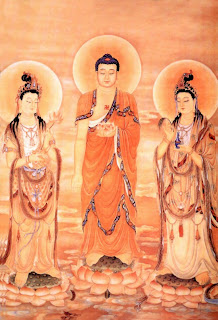From left to right.
Mahastamaprapta 大势至菩萨 (da shi zhi pusa) - Amitabha Buddha 阿彌陀佛 (amitofo) - avalokiteshvara 觀世音菩薩 (guan shi yin pusa)In my last class in Psychology of Religion, the lecturer asked, does Buddhist think about good things? I raised my hand and replied "no". I don't know what was the message received by her, but she replied something along the line, "Buddhist think good things la".
As usual, if it's not something I can explained quickly, I refrained from talking in the class. I know it's common in religion teachings to do good, in speech, thoughts and action. I also know that, there are practice in Buddhism that required the cultivator to think "bad", such as staring at the corpse to realize how foul the living body can be in sight and smell, with the purpose to realize the living body is impermanence, and reduce the attachment for the human body.
Practise of a certain direction in dualism value, is to discipline and to balance. For example, if I never understand the merit of being kind and compassion to people, ideally, it is good for me to start having good and kind thoughts towards people. For those who already practise compassion in their daily life with ease, it would be great to compliment the practise with wisdom, learning how to be flexible and control. Compassion and wisdom have to come together, like a pair of wings.
However, to be good, or to have wisdom is not the sole purpose of Buddhism. In a meditative state, a Buddhist aim to enter Samadhi, for pureland 净土 practise, it is to chant namo amitofo so focus that there's no other thoughts but namo amitofo. In the end, you dont' even chant or think about amitofo but you are still doing it.
Above shown is commonly known as the 3 saint from the west, 西方三圣。Especially amitofo and
avalokiteshvara, both are commonly worshiped in northern buddhism temple or chinese families.
